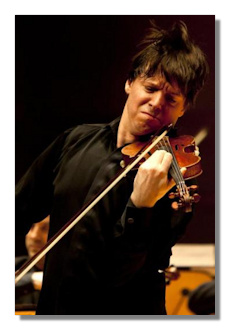
The Internet's Premier Classical Music Source
Related Links
- Latest Reviews
- More Reviews
-
By Composer
-
Collections
DVD & Blu-ray
Books
Concert Reviews
Articles/Interviews
Software
Audio
Search Amazon
Recommended Links
Site News
 Concert Review
Concert Review
Academy of St.-Martin-in-the-Fields at the BBC Proms

Pure Joy at the BBC Proms
- Felix Mendelssohn:
Overture "A Midsummer Night's Dream", Op. 21 - Camille Saint-Saëns:Violin Concerto #3 in B minor, Op. 61
- Frank Bridge: Lament (Catherine, aged 9, "Lusitania" 1915)
- Ludwig van Beethoven: Symphony #4 in B Flat Major, Op. 60
Joshua Bell, violin
Academy of St Martin in the Fields/Joshua Bell
London, Royal Albert Hall, 12 August 2018
The Academy of St Martin in the Fields (ASMF) brought an utterly delightful matinee concert at the BBC Proms under their music director, violinist Joshua Bell. The joys were manifold. For one thing, it was a beautifully varied bill, including a couple of rarities. But above all this was a concert that demonstrated the pleasure of making music together, by a first-class ensemble of 40 musicians breathing as one and visibly enjoying their moment in the spotlights. Acting both (or simultaneously) as conductor and as soloist, Joshua Bell appeared a true inspirational force. Conducting from the leader's chair (if not playing, wielding his bow as baton) in Mendelssohn, Bridge and Beethoven, he went centre stage to play and direct Saint-Saëns' Third Violin Concerto. And all from memory.
The concert took off with Mendelssohn's Overture for A Midsummer Night's Dream. The woodwinds had a bit of a rough start but pretty soon everything fell into place and this rendition was teeming with youthful energy and imagination. The different scenes and moods of Mendelssohn's microcosmic distillation of Shakespearean fantasy came vividly alive now with transparent textures, then again with warm colors and subtle shading. While Bell kept things going at a lively pace, the sound quality of the ASMF was outstanding throughout.
The concertos from Camille Saint-Saëns are rarely heard in the concert hall. Of his five Piano concertos only the Second is occasionally performed, and his Violin concertos fare even worse. And come to think of it, his symphonies aren't exactly flooding the concert programs either. Interesting to read in the Proms program notes that Saint-Saëns was pally with Proms founder-conductor Henry Wood and that his Third Violin Concerto was a popular favorite at the time, receiving no less than 16 performances between 1898 and 1928 – although apparently only the slow movement initially. But only one in the following 90 years (in 1989).
The current revival by the ASMF was in this respect all the more welcome and with Bell's authoritative reading we couldn't have had a stronger advocate to get this lovely piece back in the mainstream concerto repertoire. It was quite a stunning tour de force for the soloist/conductor, alternatively facing the public and his orchestra. Ever graceful in projection and warmly attractive in timbre, Bell immediately hit the right balance between virtuoso display (it was written for legend Pablo de Sarasate after all) and romantic lyricism. The barcarolle-like Andantino quasi Allegretto sung in all its elegance, fusing violin with woodwinds in a ravishing dialogue. Naturally, Bell was the soloist and he got the brilliant parts (which he negotiated effortlessly), but the success and conviction of this reading was eventually due to the admirable teamwork, or rather companionship, between him and the orchestra. As said, an irresistible sense of making music together was running strong the whole concert, but this quality was never more palpable as in the concerto.
After the interval Bell and the string players of the Academy performed Frank Bridge's short Lament, composed to commemorate the brutal sinking of the "Lusitania", a British ocean liner by a German submarine in 1915, taking 1,200 passengers to the bottom of the Atlantic. Bridge was friends with the Crompton family who perished in the disaster and composed this 5 minute Lament in memory of 9-year old Catherine Crompton. Again, a rarity for the Proms as the piece hadn't been performed there since its premiere in 1915. A remarkable work in its dense but subtle string writing, and most impressively done here.
In order not to interrupt the impact of the memorial piece Bell wanted to segue from the Lament into the following Beethoven Fourth Symphony, however due to a slight hesitation of his part all good intentions were torpedoed by premature applause from eager Prommers. Still, once under way after the searching introduction, this Beethoven was pure sunny joy, excitingly muscular and crisp in the outer movements, warm and tender in the Adagio, but always full of ‘joie de vivre'. A convincing orchestral balance, clear textures, excellent solo work and impressive dynamics highlighted the quality of the ensemble again and under Bell's direction the whole work seemed infused with an unstoppable drive running through all the movements. To his credit, Bell clearly doesn't consider the Fourth Symphony a mere "divertissement", but really a worthy companion for the usually higher esteemed Third and Fifth. It didn't matter this was a small ensemble playing the gigantic Royal Albert Hall, this sweeping account of Beethoven's Fourth made a very strong impression indeed.
It is now 7 years that Joshua Bell took over the music directorship of the ASMF from the late Sir Neville Marinner, but judging from this concert the orchestra is in the best of hands and can definitely look forward to its 60th anniversary in the 2019/20 season in full confidence.
Copyright © 2018, Marc Haegeman












